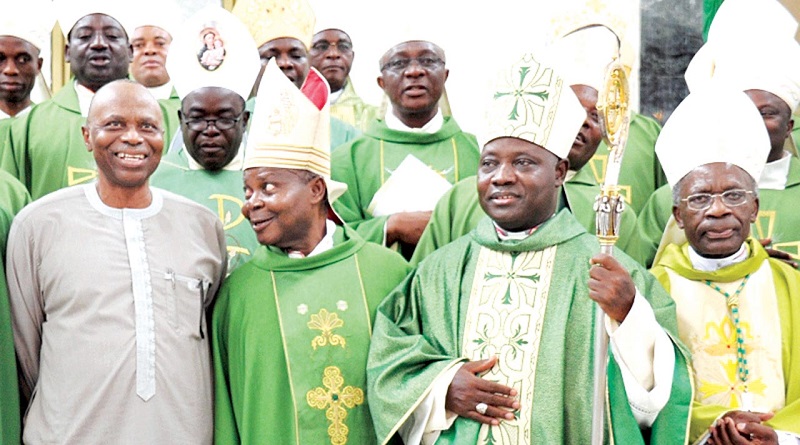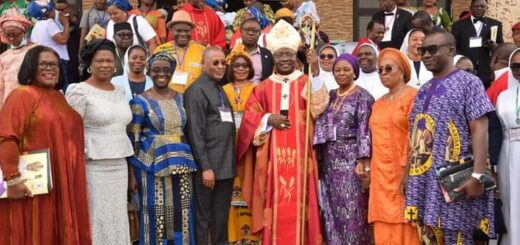5TH RECOWA MEETING: WELCOME ADDRESS OF THE PRESIDENT
5th STANDING COMMITTEE MEETING
ASSINIE 27th TO 31st MARCH 2017
WELCOME ADDRESS OF THE PRESIDENT
Your Eminence Arlindo Cardinal Futardo, Bishop of Praia,
Your Excellency, The Apostolic Nuncio in Côte d’Ivoire,
Your Excellency and dear brother Raymond Ahoua, Bishop of Grand-Bassam,
Your Graces and Excellencies, Members of the Standing and Presidential Committees of RECOWA,
Reverend Father Richard N’gole, Parish Priest of St. Theresa of the Child Jesus of Assinie parish,
Reverend Fathers,
Reverend Sisters,
My Dear Distinguished Guests,
My dear people of God,
On behalf of all the Catholic Bishops of the Regional Episcopal Conference of West Africa (RECOWA), and in my capacity as President of the Conference, I wish to express my warmest greetings to you all.
To you members of the Standing Committee, I welcome you and thank you for every effort and sacrifice made in order to be present at this 5th meeting.
I welcome in a particular way our brother Arlindo Cardinal FUTARDO who is participating in our meeting for the first time. Your Eminence, kindly know that we highly appreciate your presence. I thank God for bringing you here sound and safe. To him be the glory.
I present apologies on behalf of John Cardinal ONAIYEKAN. He longed to be here with us. For that reason shortened his trip to Italy in order to be part of this meeting in Assinie. But as God would have it the pain in his right leg compelled him to cancel the trip to Assinie. Let us pray for his quick recovery.
Beloved brothers and sisters,
We are in the grace-filled season of lent and all the activities that normally go with this season; yet you have still found time to be here. It is my prayer that the inherent graces that go with this special season reach you together with my greetings.
May the graces that you also brought with you be abundantly bestowed on our brother Raymond, the Bishop of Grand-Bassam, the sons and daughters of Assinie; and indeed the whole town of Assinie who did not spare time, energy and money to host us during these few days of our 5th Standing Committee meeting.
I recall very well the short June visit in this wonderful seaside resort and how we were generously and spontaneously received by Mr. Pierre Magne and Mr. Guillaume Koffi. This was how the idea of a meeting here was generated. I thank them and all of you for allowing God to use you as his instruments to bring us to Assinie, and for making it possible that the meeting is taking place today. With the Cardinal of Praia in Cape Verde who is coming to Côte d’Ivoire for the first time, and many Archbishops and Bishops present here, we can rightly say that Assinie has become, for these few days, the headquarters of RECOWA. It is certainly the design of God since I hear that Assinie was actually the door of penetration of the first missionaries in Côte d’Ivoire in 1637. This is also the first time the laity are sponsoring a meeting of the Standing Committee of our Conference. I thank God that it has started with the people of Assinie; and that other laymen and women will imitate your example.
My dear bothers and sisters, the Standing Committee is the Executive body of RECOWA which is the organ of liaison and co-operation among all the Catholic Bishops of West Africa and between the National or Inter-territorial Conferences in matters of common interest.
Coming together this way, gives me a lot of joy because, after five years RECOWA has come to age to make its voice heard and its presence felt in our region. This explains the theme of our 5th meeting: THE NEW EVANGELISATION AND ITS CHALLENGES FOR THE CHURCH, FAMILY OF GOD IN WEST AFRICA: THE ROLE OF THE EPISCOPATE IN THE PREVENTION, MEDIATION, RESOLUTION AND TRANSFORMATION OF CONFLICTS. This theme is motivated by the following sypnosis of the socio-political, religious and environmental contexts of our various countries:
-Political Context
When we look at the political context of our region, we can see that there are still few cases of poor democratic transitions due to many factors such as non-respect for the rule of law, weak institutions, shrinking space for political participation/engagement with constant human rights violations and tortures. The arrest and abuses of the human rights of some opposition politicians, Civil Society Organisations and Faith Leaders are clear violation of relevant treaties, laws and legal frameworks to which all countries have registered acceptance and commitment.
The political tensions caused by the manipulation of constitutions and the electoral processes weaken the people’s participation in governance. Politicians take advantage of ethnic and religious divisions to achieve their selfish desires. Elections cost much due to bribery of voters and post-election arbitrations.
-Religious Context
These recent years have revealed to us that West Africa is experiencing an upsurge of violence due to religious extremism. The main issue is that the dimension of these conflicts has gone from religious intolerance to terrorism. Wherever the terrorist groups exist, their perceived desire is the islamization of the countries concerned. Examples include Nigeria, with boko-haram insurgency since 2009; Mali, with its array of separatist movements under the guise of Islam since 2012; Burkina Faso and Côte d’Ivoire with terrorist attacks in 2015 and 2016 respectively.
-Environmental Context
The recurrence of natural disasters and diseases such as floods; storms, food insecurity, migration and humanitarian crises related to climate change have become a serious threat to human and animal survival. Efforts of adaptations and mitigation undertaken by various local communities and sometimes, with the support of their governments, are hampered by inadequate knowledge and means. The impact of natural and manmade disasters and conflicts (which most often cause migration, sometimes at the risk of human lives) underscores the importance of prevention and preparedness.
This sypnosis touches on what Pope Paul VI wrote in his encyclical entitled Populorum Progressio (March 27, 1967), and I quote ” Today it is most important for people to understand and appreciate that the social question ties all men together, in every part of the world.” N.3); and the Pope reveals to us in n° 75 that “development is the new name of peace” (n. 75). For him, the solution to social problems lies in development. It refers to living conditions, social and cultural advancement, political accountability, participation in world affairs. Among the many challenges addressed by this encyclical are the problems of demographic growth, migration, literacy, industrialization, justice and fairness in commercial and international transactions.
When we draw the attention of our leaders on these issues, we are not doing politics; and we don’t want to do politics. We have enough commitments with our pastoral duties. But as Pope Benedict XVI pointed out in his Encyclical Deus Caritas Est, and it is obvious, “the just ordering of society and the State is a central responsibility of politics. As St Augustine once said, a State which is not governed according to justice would be just a bunch of thieves: “Remota itaque iustitia quid sunt regna nisi magna latrocinia?”[18]. Fundamental to Christianity is the distinction between what belongs to Caesar and what belongs to God (cf. Mt 22:21), in other words, the distinction between Church and State, or, as the Second Vatican Council puts it, the autonomy of the temporal sphere.[19] The State may not impose religion, yet it must guarantee religious freedom and harmony between the followers of different religions. For her part, the Church, as the social expression of Christian faith, has a proper independence and is structured on the basis of her faith as a community which the State must recognize. The two spheres are distinct, yet always interrelated (28). In other words, the Church “cannot and should not remain apart in the struggle for justice.
In the light of what preceeds, RECOWA needs to ensure that appropriate activities at the regional and country levels are undertaken; and that these activities move down in action to the grassroots.
It is by doing this that we shall remain faithful to our mission which is to inspire and strengthen the Church, Family of God, in West Africa for a credible witness through the promotion of Unity and Solidarity,
My brothers let us not lose sight of the vision that we have developed for our organization. A regional organization that helps its people to live in freedom, peace and dignity in order to develop its potential through a socio-political strengthening of its capacity based on the Social Teaching of the Church.
As we meet to discuss some of the specific challenges of the Church of West Africa and some specific issues of our Conference, we also see our presence here in Assinie as a Pastoral Solidarity visit to the Church and people of God in Côte d’Ivoire, in general and in Grand-Bassam and Assinie in particular.
May I use this opportunity to express the hearty gratitude of the Conference to the Ivorian authorities, the President, the Government, the Sous-prefet of Assinie, the king of Assinie and his Court, the representatives of the various religious confessions, the Christ lay faithful and all the sons and daughters of Assinie, especially those among you who have put at our disposal your houses and actively organized ours stay. Right from the airport to here in Assinie, you did not spare any means, to make our stay a happy and memorable one. May God bless you abundantly for the generosity of your hearts.
To you members of the Standing Committee, once again I welcome you all and wish you a happy stay in this paradisiac resort of Assinie. I pray for fruitful deliberations under the guidance of the Holy Spirit.
Thank You
March 29, 2017
Most Rev. Ignatius A. KAIGAMA
Archbishop of Jos
President of RECOWA




